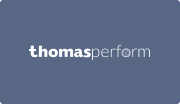
As 2022 begins, we talk with Thomas International’s newest Senior Leadership Team member, Gareth Jones, about why people and product aren’t opposites, his love-hate relationship with the assessment industry, and how his personal journey has impacted his professional one.
Why did you decide to join Thomas International?
I've been around the industry for a long time. I started my career in HR and I guess I had an interesting relationship with the industry. My first experience of proper work was an industrial placement in a company called B.A.E. Systems which was an aeroplane-building business, and I was stunned when I joined how awful it was, how claustrophobic it was. It was very ‘command and control’ and you couldn't leave your office between 9:00 and 11:00. You could only leave the actual physical office when you were going to lunch or going to the toilet, which I found really archaic.
When I got to into my first proper job as HR person later, I got into the people side because I found it really exciting, but despite all the verbiage about “people are our greatest asset”, it was still just not true. So I had a really tough relationship with being in HR for ten years, and that's why I left in the end. Having said that, that started my curiosity around people, and why we treat them the way we do, and why they behave the way they do. That's the reason I got into it. I began the journey then to start to think about, ‘How do we how do we connect with people better? How do we get the most out of them? How do we understand people?’
From the get-go it struck me that what we were doing was pretty basic. We look at someone’s CV, we knock up a job description and we use people's opinions to determine whether they were talented or not. It never sat well with me that we would have 2% of the organisation classed as ‘high performers’ or the future talent, either based on the fact that they were liked in the business, or that they got a first-class degree from somewhere that was worth having a first-class degree from. So I made it a bit of a mission in my life to explore whether this was the full story. Back in those days the Internet didn't exist, so you had to go to the library and look for outlier companies in magazines and stuff like that. So that started me on a bit of a journey of trying to understand people better and challenge how we come to decisions about people and how we get the best out of them, because we weren’t getting the best out of them, or that was my view anyway, at the time.
"It’s incredibly important that people understand and own who they are."
- Gareth Jones, Chief Digital Officer, Thomas International
Being in HR I got exposed to the assessments industry of course. I took a lot of assessments myself, in fact I did Thomas assessments back in the day, and in fact I thought that in the beginning Thomas was probably one of the few that went down the technology route and moved away from pen and paper, way before SHL and some of their competitors did. The assessment industry was fascinating for me because it wasn't widely used, but where it was used it would seem to be THE thing, the decision-making point, and I always had a little bit of trouble with that too. That we would train up some HR people and all of a sudden they would be making big decisions about people based on the assessments. We’ve moved away from that, they are more informative than decision-making now, which is much, much better.
But that whole process of understanding work and understanding people really fascinates me and has been a key theme throughout my career. Trying to understand human potential, I guess is how you’d put it. I’m fascinated by it, and I think we do a lousy job of it generally in companies. We really do low ball it in terms of investment in understanding our people. I've been fascinated by that, and I've had this love-hate relationship with the assessment industry, because on the one hand they are the folks that have the frameworks that help us understand people, they’ve got the research, they have the science, they have the capability and the data. But on the other hand, they haven't really made the transition to innovation. Then in the last five to ten years, technology has really come to the fore. There are companies creating solutions where the assessment, or the ‘Intellectual Property’ (IP) if you like, powers the solution but isn’t the solution. These companies are using technology to look at which problems their clients are trying to solve, which processes they are engaged in, and using their IP to power their tools. Assessment companies were in pole position to take some of that market share, and they didn't, and I guess it's because of the framework that they've always existed in.
So when I got approached by Thomas and I learned about the ambition to effectively make that transition from an assessment or IP business to a solutions business, to bring that IP and all that knowledge and capability and position it as leading-edge solutions, it really interested me.
Why are your passions (for people and technology) not contradictory?
There are some ethical, brilliant ways we can use technology to make our lives at work easier. Previously, the way we have managed people through technology has been really poor. The technology for HR, recruitment and development systems, all that stuff is just awful and clunky and horrible. As a candidate applying for a job if I'm going through a clunky process, then that does affect what I think about that company. I think Virgin did the big study where they worked out that their recruiting process was turning people off Virgin Media and turning them onto Sky, and they reckoned it cost them £4,000,000. It’s all about a person’s experience.
We've created problems with technology. Pre-Internet I would go home at five or six in the evening and never get called by my boss unless the factory was burning down. Other than that, it was lights off and I had my own life from 6 o’clock until the following morning. Technology has come in and all it's done is forced us into an inefficient, unproductive, highly stressful world. That for me is a bad use of technology. Technology also means I could work from anywhere, flexibly, at a time that suits me. But I can’t because it’s sat within in this framework of an old business. That’s a framework that needs to be broken down. I think if we can understand people better using technology, help them understand themselves, and provide better opportunities in a much more seamless, flexible way, we will have happier, more engaged and productive people. That whole revolution of unlocking our capability and removing bias through technology is where the opportunity is, I think. The opportunity to help people work creatively and flexibly is huge.
"It’s all about a person’s experience."
- Gareth Jones, Chief Digital Officer, Thomas International
Will you share any insights that you have gained from your own assessments?
I’m a big believer – which my assessments picked up – in being completely open and transparent. In my early career I lacked a lot of confidence. That’s obviously something from my childhood, I guess, but it took me a long time to come to terms with the fact that actually my profile of being reasonably emotionally sensitive, open, transparent, and non-controlling etc. was a good thing. Historically, to be a leader you had to be ‘strong’, you couldn’t be ‘nice’. I thought “I’m never going to get the leadership role in that case, because I’m just not wired that way.” You can pretend to be like that, but it doesn’t really do you any favours. Assessments have helped me come to terms with who I am and helped people understand who I am as well.
I don’t like confrontation but by the same token I don’t avoid addressing it. If something is amiss, I’ve learned to be straight there, because I’ve learned in the past that avoidance holds you back. Assessments really open people’s eyes to these kinds of things. They are useful in recruitment, but the beauty of the assessments for organisations is that they create a common language with which to understand each other. For instance, I’m a reflector, so if there’s a situation in a meeting where something drops on the table and people want my input, sometimes I might be able to talk lucidly about it, but because of my profile I would rather go away, think for 24 hours and give a learned response. If I don’t, there’s a big danger that I’m going to sound like I don’t have a brain cell in my body.
That’s just something about my personality, but being able to share that is hugely useful. Because then you have permission to be you. I think it’s incredibly important that people understand and own who they are. A few years ago, we became a bit obsessed in business with categorising some things as good and others as bad. Actually, you've just got to work out where your strengths are and how you accommodate those things. No point working on weaknesses. Just find out what you’re great at, what you really want to do, and then create an environment where you can do that. The Thomas assessments can help businesses do that.
Your previous company trebled in size during your tenure as CEO, what are the secrets of your success?
I’ve just come from a company called Headstart where I was CEO for four years, and before that was at Chemistry for six years. I started in HR, and I left HR naively thinking "I’ll go and get a commercial job and then I'll work out whether all this ‘people’ stuff is just nonsense that I'm being sold, or whether it actually does something.” But nobody wants to give an HR person a general management job, at least not back in the day. You had to be Finance or Sales to qualify for being a general manager or an MD or a CEO. I got lucky in the early 2000’s when somebody I know was running a recruitment business and asked me to come a run it. So that was my first go at running a business, and I did an OK job of it I think. We turned it round financially without a doubt, but I wasn't comfortable being me. I found it quite difficult not to try and just conform to what CEO ‘should be’, based on all the stuff that I had read.
Moving to Chemistry a number of years later was a massive eye opener. Chemistry is an assessment business a bit like Thomas. We used assessments in management consulting. The founder, Roger, wanted to build our own assessments and the platform on which to use them. I joined to do that as a Product person. The interesting thing about Chemistry was that they understood that a role looks very different in each company. So they developed a framework and common language with which to understand people. Everybody who worked at Chemistry went through training on how to do the assessments and understand the methodology – everyone – the accountant, the janitor, everybody. This common language was all-encompassing. It was one of the only companies I’ve seen where the values were alive every day. We only had three; ‘brave’, ‘human’ and ‘passionate’, and people intuitively awarded points for them. It was amazing to see. It was a very open business like that. There was nowhere to hide.
[Chemistry] taught me about being comfortable in my own skin, that it was okay to be a ‘reflector’ for example. It was okay for me to focus on what was really going to ‘zing’ me. The areas where I wasn’t so strong, we just backfilled. That validated for me (quite late in life) that my profile is actually okay, and that I do have the ability to go and lead a business and feel comfortable doing it the way I wanted to do it. Actually, over the last 20 years the world has moved much more towards my understanding of how people management should be, to a much more open and flexible style. It was being part of that assessment company that taught me to own who I am and lead in that way. Being open, transparent and vulnerable was transformational for me in running that business.
The business I’ve just come from was a start-up and had to do all the things start-ups do; create products, hire people, raise money. Then we went into Covid, and we had all the problems start-ups have, but we made it through because the culture was good. That was just because I focused on understanding how people were feeling about the journey we were on, gave them airtime and was pragmatic and open about what was coming next, even when that was making people redundant or ‘tightening the belt’ because the funding hadn’t come in. In a previous role, my CEO really didn’t understand my style, which was difficult. Finally, we had a 360-degree annual review and she said to me “I get it now!”, because I had the best results of all the leaders in the business. My stuff was working and solved problems. That validation was useful, but I still didn’t understand why I was the way I was and how to talk about it in a way others would understand. That’s what being in assessment companies like Chemistry gave me – a lot of confidence.



